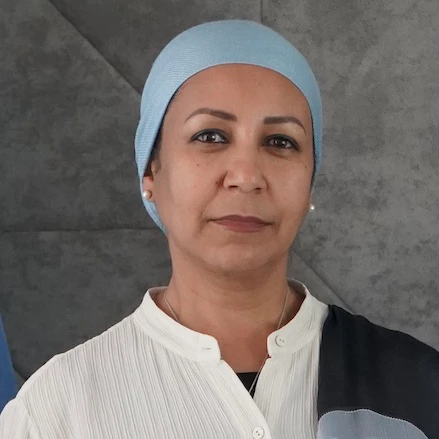 Saudi women taking part in vocational training. (Photo: World Bank/Dana Alrayess)
Saudi women taking part in vocational training. (Photo: World Bank/Dana Alrayess)
A decade ago, Technical and Vocational Education and Training (TVET) was viewed as a second-tier educational path for Saudi women, constrained by societal perceptions and limited range of occupations deemed appropriate for women. In 2016, when Saudi Arabia launched its Vision 2030, the proportion of women enrolled in TVET was amongst the lowest globally, for young women aged 15 to 24 with scope limited to office management, fashion, and cosmetology. By 2019, 17,959 Saudi women were enrolled in TVET across 29 colleges with 14 available majors.
Today, the landscape of TVET in Saudi Arabia has been completely transformed and aligned with private sector employers’ demands, following the successful implementation of Vision 2030. Saudi women are entering industries such as aircraft maintenance, cybersecurity, and renewable energy, with TVET playing a central role in building skills needed for this new era. Legislative, policy, and labor market reforms have reshaped opportunities for women and removed barriers that once constrained their entry into the workforce. Women in Saudi Arabia can now work in any industry, with labor force participation reaching 35.8% in 2024, exceeding the original target of 30%.
The impact of reforms is evident in TVET. At least 13 major policy changes led to the establishment of 14 international technical colleges for girls, 37 female technical colleges, and three digital technical colleges, offering an expanded selection of degrees leading to over 41,000 female students enrolled in 2022.
A Vision for Empowerment: The Role of Vision 2030
Rooted in Vision 2030, Saudi Arabia has reformed civil and labor laws to enhance a vibrant society, focusing on designing a skills development system and empowering women in the labor market through training and upskilling. The direction of the TVET sector aligned with the country's strategic goals of diversifying away from the oil and gas industries, and focuses on building a skilled workforce in line with demands of private sector employers. Expansion of TVET to strategic industries such as renewable energy, aviation, hospitality, and technology, reflects changing aspirations among Saudi women.
In February 2025, a team from the World Bank had an opportunity to visit the International Aviation Technical College in Riyadh, a previously male-only institution, one of the many colleges across the country that has begun integrating female students. The cohorts of female students are also partnering with their future private sector employers, such as Riyadh Air and a drone company. One of the first female aircraft engineers to join this new program shared, “I’m the first engineer in my family, and this makes my family proud and excited.” Another added, “I think my father is even more proud than I am, he is the one who pushed me to apply.” A third student reflected, “My father was an airplane technician for years, so I wanted to be part of this.” This cohort of 47 women represents a new era for Saudi women in TVET.
Partnership to support women’s empowerment in TVET
The World Bank has been supporting TVET in Saudi Arabia as part of the broader, longstanding relationship with the kingdom, which marks its 50th anniversary this year in its partnership to drive policy reforms across numerous sectors of the economy.
A recent example highlighting the strength of this collaboration is the jointly produced report by the World Bank and the Technical and Vocational Training Corporation (TVTC), “Unlocking Opportunities: Empowering Women in Technical and Vocational Education and Training in Saudi Arabia.” The report examines Saudi Arabia’s ongoing transformation in TVET, offering insights into what has worked, what challenges remain, and how the country can sustain and expand these gains. It also provides a guiding framework and international best practices for further strengthening female participation in TVET and addressing persistent barriers that historically limited women’s enrolment. The report serves as a resource for policymakers, educators, and industry leaders looking to build on this momentum and further solidify TVET as a transformative force for women’s empowerment and economic growth, in Saudi Arabia and beyond.
According to the UNEVOC report on boosting gender equality in sciences and technology, factors impacting female participation in TVET fall under three umbrellas: 1) societal level barriers such as social norms and public policies, 2) institutional level barriers such as policies and environment, learning infrastructure, labor market organization etc, and 3) at the individual level with personal learner interests and motivations as well as family and peer expectations.
Graph from UNEVOC Report, Boosting gender equality in science and technology: A challenge for TVET programmes and careers. (2020)
The Road Ahead
Saudi Arabia’s journey toward improving its Female Labor Force Participation (FLFP) and inclusive workforce development is a testament to the power of strategic vision, legal reform, and targeted initiatives. While challenges persist, the progress made so far is both significant and inspiring and firmly positions these efforts as good practice for other countries to follow. Through its partnerships, the World Bank remains committed to supporting Saudi Arabia in advancing these reforms and building on this progress toward a more inclusive and future-ready workforce.





Join the Conversation